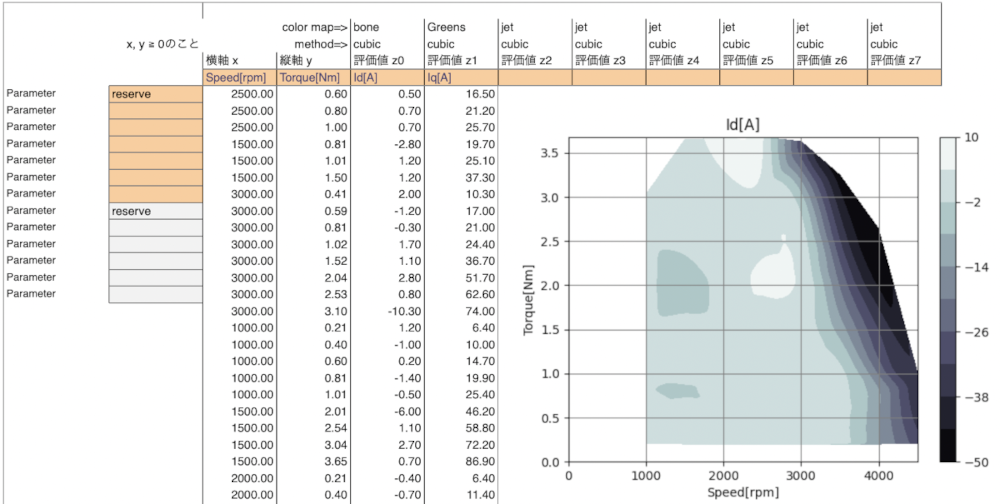
Draw a contor graph into the .xlsx file
2軸で定義された粗めのデータ配列から補間演算をしてコンター図を作成する。UIはWebで。プラットフォームはstreamlitを利用。
他のプラットフォームへの実装についてはfastapiを利用した作例がある。
fastapiへの実装例
Data flow
データフローを下図に示す。contour_template.xlsx にデータを登録する。それをweb appでアップロードし計算後に結果ファイルをダウンロードする。結果ファイルにはコンター図が挿入される。
graph LR
indata[input data]
temp[contour_template.xlsx]
src[input.xlsx]
web[Web<br>Interpolating &<br>drawing contour]
dist[output.xlsx]
indata --> src
temp --> src
src --> web --> distrequirements.txt
github で streamlit を利用するためには python で import するモジュールのバージョンを指定するファイルを用意する。
numpy==1.24.2
streamlit==1.9.0
matplotlib==3.7.0
openpyxl==3.1.1
scipy==1.10.1
pydantic==1.10.7Source code
openpyxl を利用してエクセルファイルを操作する。補間は scipy の interpolate を使用しグラフは matplotlib で描画した。
#!/usr/bin/python3
import streamlit as st
import numpy as np
import openpyxl as px
import matplotlib.pyplot as plt
from pydantic import NoneIsAllowedError, NoneIsNotAllowedError
from scipy import interpolate
from io import BytesIO
import tempfile
from openpyxl.drawing.image import Image
TEMPFILENAME = "drawcontour_template.xlsx"
HEADER_POS = 'C5' # excel cell position of parameters
GRAPH_POS = 'M6' # excel cell position of drawing graph
GRAPH_POS_DEF = 26 # excel cell raw offset of drawing graph
N_POINTS = 2000 # contour resolution of x and y
N_LEVEL = 11 # color level N + 1
G_INIT = 0 # general initial state number of process
G_UPLOADED = 1 # general upload state number of process
G_END = 10 # general end state number of process
""" main process
display screen
button, download, upload
in
state: number of the process index
out
non
"""
def main(state):
st.session_state['state'] = state
st.header("Draw contour into .xlsx")
# display download button for template file
with open(TEMPFILENAME, "rb") as fdata:
st.download_button("Download template .xlsx file",
data=fdata,
mime='xlsx',
file_name=TEMPFILENAME)
st.session_state['state'] = G_INIT
# display file uploader
upfile = st.file_uploader("Upload xlsx file",
type="xlsx",
accept_multiple_files=False,
key=None,
help=None,
on_change=None,
args=None,
kwargs=None,
disabled=False)
if upfile: # after uploading
st.session_state['state'] = G_UPLOADED
# make a tempolary file and drawing contours in it
with tempfile.NamedTemporaryFile() as tmp:
st.session_state['state'] = draw_contour(upfile, tmp.name)
fdata = BytesIO(tmp.read())
# after drawing contours, display the download button
if st.session_state['state'] == G_END:
st.download_button("Download Result file",
data=fdata,
mime='xlsx',
file_name=upfile.name)
""" drawing contours
check the worksheets
display checkboxes, buttons
in
upfile: file like object
outfilename: tempolary filename for drawing
out
res: number of process index
"""
def draw_contour(upfile, outfilename):
wb = px.load_workbook(upfile, data_only=True)
sheetnames = wb.sheetnames # get the sheetnames of the workbook
sheetlist = {}
res = st.session_state['state']
# display the checkboxes of the sheetnames
for sheetname in sheetnames:
sheetlist[sheetname] = st.checkbox(sheetname,
value=False,
key=sheetname,
help=None,
on_change=None,
args=None,
kwargs=None,
disabled=False)
# display the button and drawing the contours of checked sheets
if st.button('Draw Contour'):
st.write('Drawing...')
for sheetname in sheetnames:
if sheetlist[sheetname]:
contour(upfile, sheetname, outfilename)
res = G_END
return res
""" drawing a contour
save the result workbook
in
fileobj: file like object
in_shname: target sheetname
outfilename: tempolary filename for drawing
out
non
"""
def contour(fileobj, in_shname, outfilename):
wb, ws, x_label, y_label, z_label, x, y, z, cmaps, methods = set_parameter(fileobj, in_shname)
make_contour(wb, ws, x_label, y_label, z_label, x, y, z, cmaps, methods)
wb.save(outfilename)
""" set the parameters for drawing contour
in
in_fpath: file like object
in_shname: target sheetname
out
wb: workbook object
ws: worksheet object
x_label: x axis label string
y_label: y axis label string
z_label: z axis label string
x: the 1D array of x
y: the 1D array of y
z: the 1D array of z
cmaps: list of color map
methods: list of interpolating method
"""
def set_parameter(in_fpath, in_shname):
# open workbook as data, ignore formula for reading parameters
wb = px.load_workbook(in_fpath, data_only=True)
ws = wb[in_shname]
wb.active = ws
x_label = ws[HEADER_POS].value
y_label = ws[HEADER_POS].offset(0, 1).value
z_label = []
methods = []
cmaps = []
x = np.array([])
y = np.array([])
for col in ws.iter_cols(min_row=5, min_col=5, max_row=5):
for head in col:
if not head.value is None:
z_label.append(head.value)
methods.append(head.offset(-2, 0).value)
cmaps.append(head.offset(-3, 0).value)
for row in ws.iter_rows(min_row=6, min_col=3, max_col=4):
if is_num(row[0].value):
x = np.r_[x, float(row[0].value)]
if is_num(row[1].value):
y = np.r_[y, float(row[1].value)]
n_z = len(z_label)
n_data = np.size(x, 0)
z = np.array([])
for col in ws.iter_cols(min_row=6, min_col=5, max_row=5+n_data, max_col=4+n_z):
if not col[0].value is None:
zi = np.array([])
if np.size(z) == 0:
for data in col:
if is_num(data.value):
zi = np.r_[zi, float(data.value)]
z = np.array([zi,])
else:
for data in col:
if is_num(data.value):
zi = np.r_[zi, float(data.value)]
z = np.r_[z, [zi]]
# open workbook as not ignore formula
wb = px.load_workbook(in_fpath, data_only=False)
ws = wb[in_shname]
wb.active = ws
return wb, ws, x_label, y_label, z_label, x, y, z, cmaps, methods
""" drawing contour
interpolate grid as high resolution from input parameter
draw the contour from interpolated data.
in
wb: workbook object
ws: worksheet object
x_label: x axis label string
y_label: y axis label string
z_label: z axis label string
x: the 1D array of x
y: the 1D array of y
z: the 1D array of z
cmaps: list of color map
methods: list of interpolating method
out
non
"""
def make_contour(wb, ws, x_label, y_label, z_label, x, y, z, cmaps, methods):
wGraph = ws[GRAPH_POS]
pos = wGraph
xmin = 0 # np.min(x)
xmax = np.max(x)
ymin = 0 # np.min(y)
ymax = np.max(y)
x1 = np.linspace(xmin, xmax + xmax/N_POINTS, N_POINTS)
y1 = np.linspace(ymin, ymax + ymax/N_POINTS, N_POINTS)
xx, yy = np.meshgrid(x1, y1)
zz = np.array([])
zzi = np.array([])
n_z = len(z_label)
for i in range(n_z):
if np.size(zz) == 0:
zz = interpolate.griddata((x,y), z[i], (xx, yy), method=methods[i])
zz = np.stack([zz,])
else:
zzi = interpolate.griddata((x,y), z[i], (xx, yy), method=methods[i])
zz = np.concatenate([zz, [zzi]])
for i in range(n_z):
zmax = np.max(z[i])
zmin = np.min(z[i])
if zmax < 0:
lv0 = zmin
lv0 = -np.ceil(-zmin/10.0)*10.0
lvf = 0
elif zmin > 0:
lv0 = 0
lvf = zmax
lvf = np.ceil(zmax/10.0)*10.0
else:
lv0 = zmin
lv0 = -np.ceil(-zmin/10.0)*10.0
lvf = zmax
lvf = np.ceil(zmax/10.0)*10.0
fig = plt.figure()
plt.contourf(xx, yy, zz[i], levels=np.linspace(lv0, lvf, N_LEVEL), cmap=cmaps[i])
plt.title(z_label[i])
plt.xlabel(x_label)
plt.ylabel(y_label)
plt.grid(which='major', color='gray', linestyle='-')
plt.colorbar()
buffer = BytesIO()
fig.savefig(buffer, format='png')
buffer.seek(0)
img = Image(buffer)
ws.add_image(img, pos.coordinate)
pos = pos.offset(GRAPH_POS_DEF, 0)
st.write(fig)
""" check the float type
in
s: string of float
out
bool: if s is number then True, not number then False
"""
def is_num(s):
try:
float(s)
except ValueError:
return False
except NoneIsNotAllowedError:
return False
except NoneIsAllowedError:
return False
except TypeError:
return False
else:
return True
"""
start
"""
if __name__ == '__main__':
main(G_INIT)